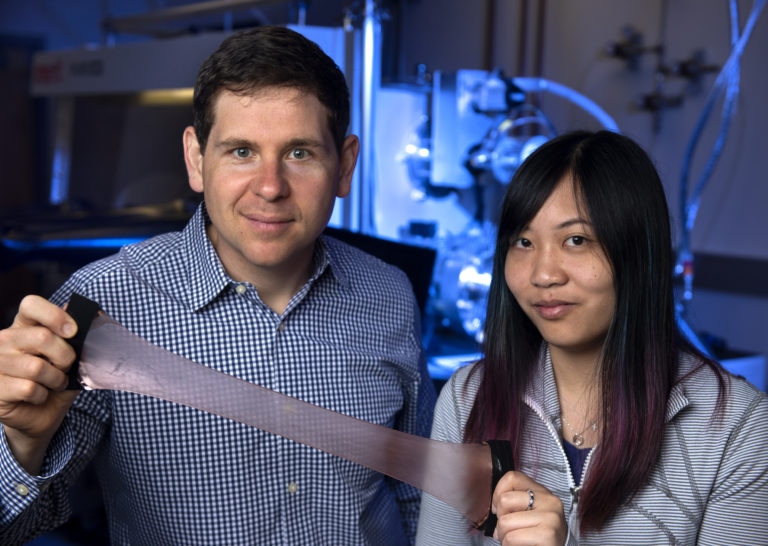Apr 30 2019
Taking design cues from the skin of furtive sea creatures, a team of engineers at the University of California, Irvine has created a next-generation, adaptive space blanket that allows users to regulate their temperature.
 Alon Gorodetsky, UCI associate professor of chemical and biomolecular engineering, and Erica Leung, a UCI graduate student in that department, have invented a new material that can trap or release heat as desired. (Image credit: Steve Zylius/UCI)
Alon Gorodetsky, UCI associate professor of chemical and biomolecular engineering, and Erica Leung, a UCI graduate student in that department, have invented a new material that can trap or release heat as desired. (Image credit: Steve Zylius/UCI)
This latest breakthrough has been described in a study recently published in Nature Communications.
Ultra-lightweight space blankets have been around for decades—you see marathon runners wrapping themselves in them to prevent the loss of body heat after a race—but the key drawback is that the material is static. We’ve made a version with changeable properties so you can regulate how much heat is trapped or released.
Alon Gorodetsky, Study Co-Author and Associate Professor, Department of Chemical and Biomolecular Engineering, University of California, Irvine.
Numerous species of cuttlefish, octopuses, and squids utilize their dynamic and adaptive skin to thrive in aquatic environments. A special ability of a cephalopod allows it to disguise itself by quickly altering its color. This is partly due to skin cells known as chromatophores that can immediately change from tiny points to flattened disks. The UCI team took its design inspiration from the skin of these sea creatures.
We use a similar concept in our work, where we have a layer of these tiny metal ‘islands’ that border each other. In the relaxed state, the islands are bunched together and the material reflects and traps heat, like a traditional Mylar space blanket. When the material is stretched, the islands spread apart, allowing infrared radiation to go through and heat to escape.
Erica Leung, Study Lead Author and Graduate Student, Department of Chemical and Biomolecular Engineering, University of California, Irvine.
Gorodetsky informed that he has a number of additional applications in mind for the innovative material—for example, to effectively control the temperature of costly and useful electronic components; to develop tents that would be remarkably good at keeping occupants comfortable in outdoor settings; and as reflective inserts in buildings to offer a layer of insulation that adjusts to varying environmental conditions.
According to Gorodetsky, clothing would be an especially fitting application for the novel, bio-inspired material. Gorodetsky teams up on research projects with colleagues at Under Armour Inc.—a manufacturer of athletic apparels.
The temperature at which people are comfortable in an office is slightly different for everyone. Where one person might be fine at 70 degrees, the person at the next desk over might prefer 75 degrees. Our invention could lead to clothing that adjusts to suit the comfort of each person indoors. This could result in potential savings of 30 to 40 percent on heating and air conditioning energy use.
Alon Gorodetsky, Study Co-Author and Associate Professor, Department of Chemical and Biomolecular Engineering, University of California, Irvine.
Marathon runners who cover themselves in space blankets would be able to attain the preferred level of thermal comfort by entering a number on a garment-incorporated user interface and thus improve their performance at the time of races and recovery at a later date.
Other advantages mentioned by Leung include durability, ease, low weight, and low manufacturing cost. She observed that the material can be expanded and returned to its original condition thousands of times.
The study was supported by the Advanced Research Projects Agency–Energy and the Air Force Office of Scientific Research. Materials characterization facilities utilized by the team were provided by Irvine Materials Research Institute of the University of California.